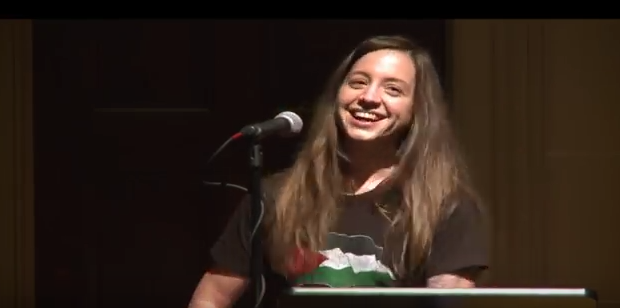
About the Library Freedom Project, the ACLU, and Tor
The Library Freedom Project (LFP), along with its partners the ACLU and the Tor Project, provides trainings for library communities, teaching people their rights under the law, and how to find and use free and open source, privacy protective technologies.
Alison spoke at this year’s Aaron Swartz Day event (video, transcript).
LFP had a bit of excitement last summer, when it and the Tor Project worked with the Kilton Library in Lebanon, New Hampshire, to set up a Tor relay. Those who run Tor relays are providing a public service, as Tor is a free, open network that helps people defend against mass surveillance by providing them anonymity online. Tor depends on thousands of volunteers who run “relays” (computer servers that support the Tor network).
Libraries are ideal locations to host Tor relays, because they are staunch supporters of intellectual freedom and privacy, and because they provide access to other essential internet services. This was the spirit behind the Kilton Library seeking to become one of the many nodes in Tor’s worldwide internet freedom system.
Tor is used by human rights activists, diplomats, journalists, government officials, and anyone else who values privacy. For instance, Journalists in repressive countries use it to publish their work without fear of government surveillance, censorship or prosecution. Domestic violence survivors use it, so that they cannot be tracked by former partners. People in African countries like Zimbabwe and South Africa use it to report poaching of endangered animals without fear of retribution.
Human Rights Watch recommends Tor for human rights advocates in their report about censorship in China. Reporters without borders suggests that journalists and bloggers all over the world should use Tor to keep themselves and their sources safe.
Tor was originally developed by the US Navy, and still gets funding from the State Department, as it is used by many high officials in the US Government.
When LFP announced the Tor relay project at the Kilton Library, that project received popular media attention and overwhelming community support. Then, in mid-August (2015), the Boston office of the Department of Homeland Security contacted the Portsmouth and Lebanon Police Departments, to warn them, falsely, that Tor’s primary use is to aid and abet criminal activity. In the face of this Federal Law Enforcement pressure, the Kilton Library shut down the project.
The kind of pre-emptory thought crime was disturbing to say the least. LFP compared the move to shutting down public parks for fear that crimes might be committed there in the future. This Kilton Letter, published by LFP, on September 2, provides a more thorough explanation of what took place and why. The letter was signed by members of the ACLU, The Tor Project, Electronic Frontier Foundation, and the Freedom of the Press Foundation.
Luckily, the Lebanon Board of Trustees had a change of heart, as explained in the Valley News article, Despite Law Enforcement Concerns, Lebanon Board Will Reactivate Privacy Network Tor at Kilton Library:
The Lebanon Library Board of Trustees let stand its unanimous June decision to devote some of the library’s excess bandwidth to a node, or “relay,” for Tor, after a full room of about 50 residents and other interested members of the public expressed their support for Lebanon’s participation in the system at a meeting Tuesday night.
“With any freedom there is risk,” library board Chairman Francis Oscadal said. “It came to me that I could vote in favor of the good … or I could vote against the bad. “I’d rather vote for the good because there is value to this.”
Interview with Alison Macrina
Lisa: So the good guys won in Kilton! Is the Tor relay still up and going strong?
Alison: Quick note: we won in Lebanon, New Hampshire. The name of the library is Kilton Library, of the Lebanon Libraries. And yes, the board and community decided unanimously to keep the relay online. Chuck McAndrew, the IT librarian, recently turned it from a non-exit into an exit, so we’re going to write a blog post soon detailing the success of the pilot and encouraging other libraries to get on board.
Lisa: Can other libraries contact you about setting up their own Tor relay?
Alison: Yes, they can contact us at exits@libraryfreedomproject.org for all the information and supporting materials they might need. We have a questionnaire for them to fill out regarding their network details. And then we can schedule a time for us to do a site visit.
Lisa: What is your advice to Librarians who are thinking about setting up a Tor relay, that might be getting pressured by their local law enforcement to not do so?
Alison: We can’t guarantee that law enforcement won’t try to halt other libraries from participating in this project, but we can use Kilton Library’s example in case such a thing happens again. If law enforcement pressures another library, we will do what we did in Lebanon — rally a network of global support to stand behind the library and urge them to continue their participation in the project. We think that our overwhelming victory at Kilton shows us that we’ll be victorious at other libraries, should it come to that.
Lisa: So there’s nothing inherently criminal about using Tor any more than there is something inherently criminal about using the Internet?
Alison: Not at all! Privacy-enhancing technologies like Tor are
perfectly legal. Tools like Tor are also the best ways to protect
ourselves against government and corporate surveillance. By using and promoting Tor Browser and running Tor relays, libraries can help
ordinary people protect their privacy and other basic civil rights.
Alison Macrina, Founder of the Library Freedom Project, spoke at this year’s Celebration of Hackers and Whistleblowers, on November 7th, and also gave a two-hour tutorial on Sunday morning, at the Privacy-enabling Mini-Conference, on November 8th.